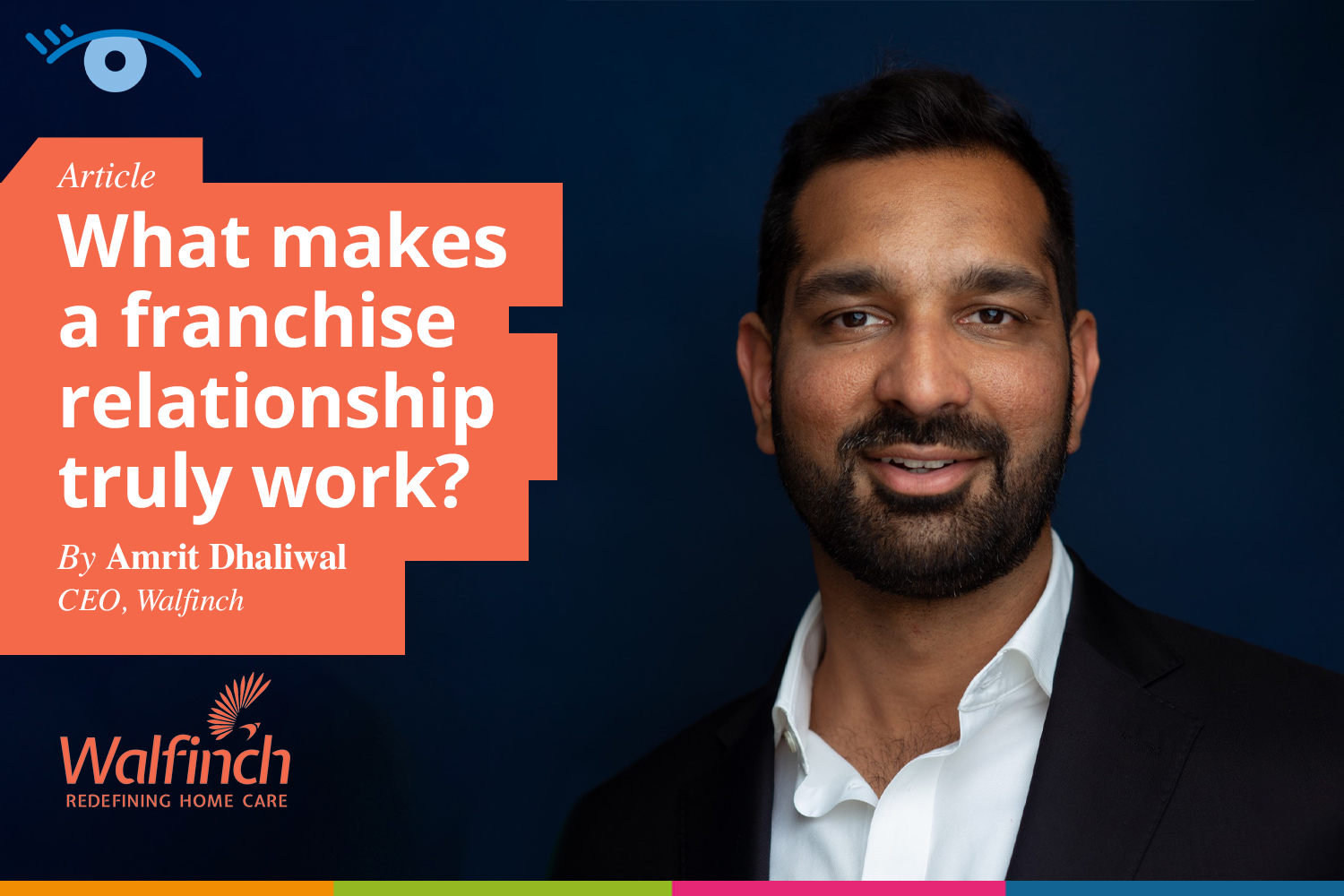
Whether you’re an aspiring franchisee or an established one, knowing the key ingredients of a successful relationship is crucial. This includes what to expect from your franchisor and what’s expected from you in return.
My company, Walfinch, thrives on a shared vision: a passion for delivering high-quality care alongside the ambition to build a successful business. These goals don’t contradict each other – they fuel each other. Because when care is excellent, reputations grow, teams stay motivated, and clients recommend you.
When Expectations Misalign
Too often, franchising gets confused with a safety net – buy a model, follow the plan, and success will surely follow. But the reality is more nuanced.
Not every franchisor provides the right support. Not every franchisee is ready to roll up their sleeves. There are roles and responsibilities which both sides must upkeep, in order to thrive. Let’s dig in.
Franchisors Must Recruit Ethically
At Walfinch, we don’t “sell” franchises – we award them. We ask ourselves, “Would I trust this person to represent us in the community? Would I be proud to introduce them to our network? Do they reflect our values?”. This ensures we’re building something meaningful, not just profitable.
Beyond franchisee recruitment, franchisors must stay true to their core values and, when building or growing their internal support team, reflect those values in the recruitment process. If a franchisor is hiring and retaining inadequate staff to support their franchisees, they are being careless with your investment.
That’s why, at Walfinch, I ensure to hire and retain ‘rockstars’ – to drive business, support our network, and thrive together.
Franchisees Must Be Willing to Pack Their Own Backpacks
Whilst a franchisor should be there to provide resources, training and ongoing support, it is the franchisees’ responsibility to pack their own backpack. A good franchisor will coach their network to thrive, and a good franchisee will take that and run with it.
Greg Renk, a Walfinch franchisee and Winner of Franchise of the Year 2024, demonstrated both trusting in the model and taking responsibility for building his own business: ‘I’m following the franchise plan to a T and the result is that the business has grown hugely since year 1. Year 2, I doubled it. Year 3, nearly again’.
It’s about respecting and using the franchisor framework but also getting out there in your local community to make it happen.
Communication Goes Both Ways
Communication is key – But it isn’t always easy.
Both parties must be open and willing to communicate and be aware of their respective ambitions – A real win-win situation. However, encouraging an open dialogue can also reveal misalignments early on. By taking responsibility and having those hard conversations, you we can prevent misplaced investments – saving both franchisees and franchisors headaches later on.
I am always keen to find out prospective franchisees’ ‘whys’ – So, we can work together to draw up a realistic business plan and help them to thrive. Certainly, as a care company, the Walfinch Team pride themselves on taking an understanding and empathetic approach to business (both in regard to our franchisees and our service users).
In Summary
By remaining clear on what’s expected on both sides, profitable, sustainable and life-changing businesses can emerge. If you bring the heart and the hustle, we’ll bring the roadmap and the team.
Together, we can thrive.
When buying a franchise it is imperative that you do as much franchise research as possible… there's no such thing as too much research! Undertaking this research will help you to properly examine all aspects of the opportunities, helping you to understand which ones to discard i.e. those that don't match up to your requirements and expectations, and which ones to look at in more detail.
In Step 4 we look at how to assess a franchise opportunity. We will equip you with the necessary knowledge to be able to distinguish a good franchise from a “bad” franchise and what to expect from an ethical franchise. We provide you with what questions to ask the franchisor and existing franchisees, and vitally, how to avoid franchise pitfalls.
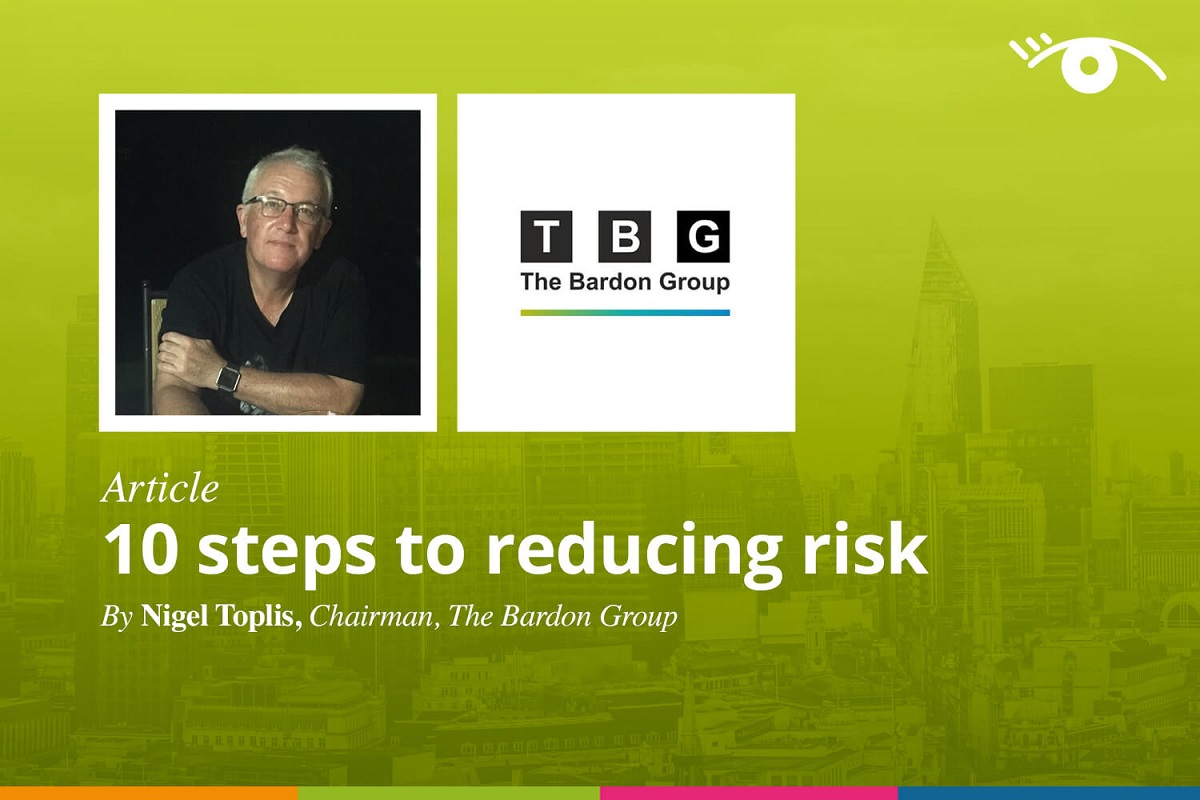
It doesn’t matter what business you are investing in – be it an independent or a franchise there is always some risk involved.
In franchising the risk of failure is demonstrably less than an independent and franchising is, theoretically at least, the perfect business ‘partnership’ - it offers substantial benefits to all parties and caters for individuals who both want to work for themselves AND create personal wealth which is directly related to the effort they are ready to invest in.
A good franchise is a ‘marriage’ with the franchisee contributing ambition, drive, energy, commitment and their own skill set and the franchisor offering experience, know-how, proven operation methods, marketing tools, sales training, technical guidance as well as a corporate identity, trademarks and the all-important brand.
Because there is this extensive support structure available franchisees come from a wide range of backgrounds and experience, and running a franchise is conducive to a variety of transferable skills, including project management, marketing, operations and sales, and the franchisor is there to help if you need to boost any skill sets.
It is this marriage of the skills, work ethic and ambition of the franchisee with the system, tools and structure of the franchisor that makes franchising the success it is – an industry worth over £17 billion and employing more people than the combined UK armed forces!
However, as we know death and taxes are the only two things in life that’s guaranteed and whilst all the research indicates that a franchise is significantly less risky than an individual start-up business nevertheless there are failures in franchising and there are risks.
I have been involved with franchising for some 30 years now and my advice when looking at buying into a franchise is:
- do your homework
- don’t rush
- don’t under invest
- choose something you are interested in!
Like most things in life, the better the preparation the better the result.
Common sense dictates that you must not over borrow – make sure you can actually afford the franchise and if not then move on.
Research the industry – is it big enough, is it growing, does it appear to have longevity?
Can you see yourself in the business? This is critical. A franchise is not a job, you can’t walk away at 5:00pm and you will be responsible for EVERY ASPECT of the business, so you had better want to be in that industry!
When you’ve worked out what you can afford, and you’ve done your homework and you’ve found a franchise (or more than one) which feels like a ‘good fit’ for your personality and your ambition then use the following 10 steps / questions to help you to dig deeper and to help you more closely evaluate the Franchisor. There is no sequence.
- Is the franchisor a member of the bfa? If so, they will have undergone rigorous checks.
- Have they been in business for several years? Longevity is a good sign of stability
- What level of support does the Franchisor offer? Do they cover sales, marketing, finance, business planning, procurement and operations – the key aspects of any business?
- Do they employ ‘real’ people and not just offer support via the telephone or online.
- I’m a big supporter of businesses that have ‘multiple income streams’ – does this business offer more than one way of generating revenue?
- How does the Franchisor make their money – if it is through on-going royalties based on performance where the Franchisor has an investment in helping you to grow the business; if they get most of their income from simply recruiting and ‘churning’ franchisees then you might want to think again.
- Does the Franchisor have a reputation for investing in the system, for updating the system, for introducing new products/services? Think of your agreement with the franchisor as a ‘lease’ and with a lease you expect regular updates and augmentations to the product, service, system.
- Ask the franchisor for access to their last 3 years accounts (to check financial stability).
- Read the Operations Manual whilst in the building (to evaluate the strength and breadth of system support) – the Franchisor will not let you take it off-site.
- Ask to speak to a selection of existing franchisees.
I hope the above helps you in your process of evaluating the right franchise for you.
About Nigel Toplis
Nigel Toplis is Managing Director of The Bardon Group stable of franchises which includes Kall Kwik, Recognition Express and Techclean. The Group specialises in developing and growing franchised businesses in the UK.
The importance of brand identity in franchising
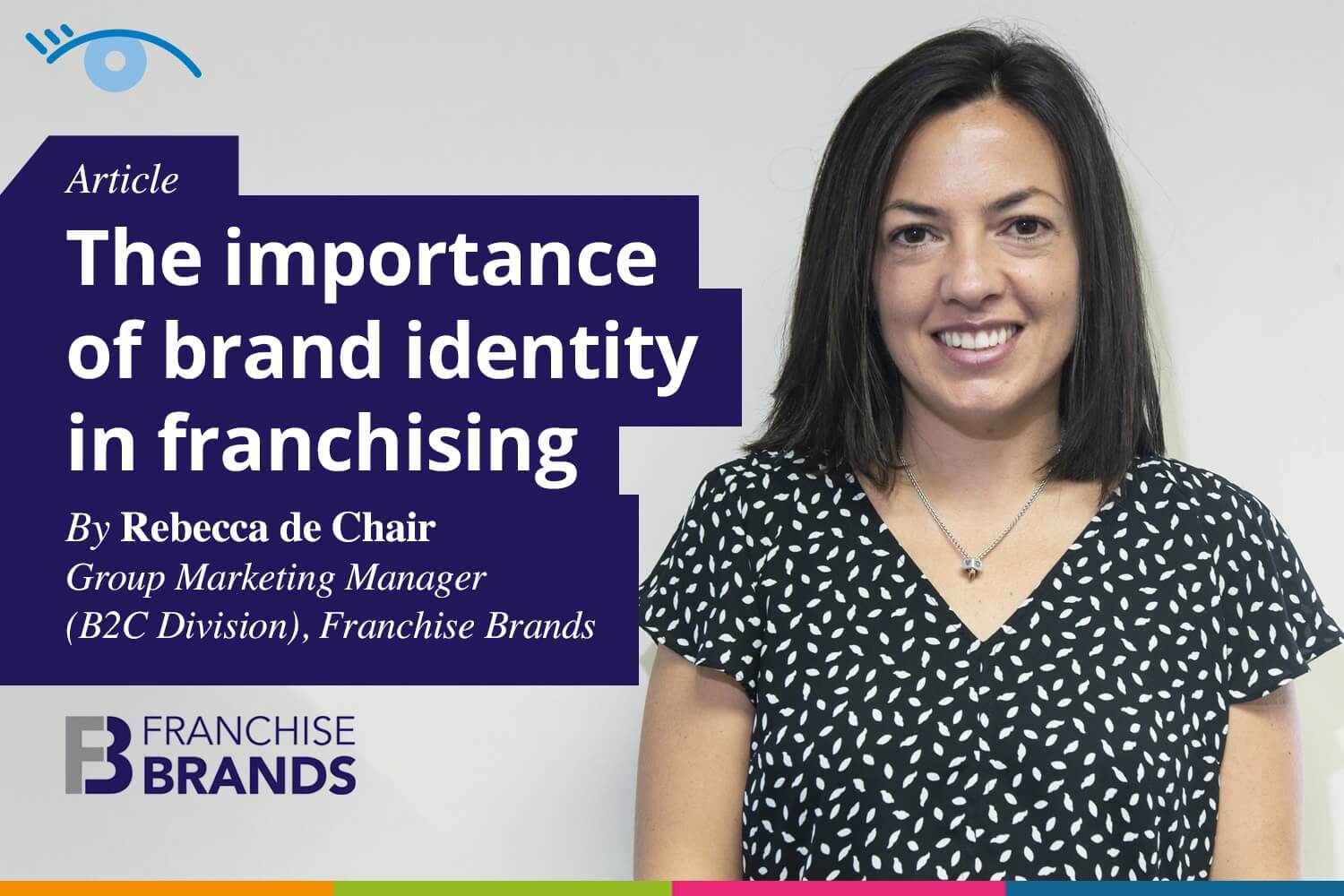
In this article, Rebecca de Chair, Franchise Brands talks to us about the importance of brand identity.
Many people fail to understand why branding and brand identity is so important when setting up a business. A brand goes far beyond a logo – it encompasses everything about a business, from company values to customer experience. Ultimately, a brand is a promise to your customers, and has more potential to be successful than a business with no story.
By buying into a franchise with a reputable brand name, like ChipsAway, Ovenclean or Barking Mad, a lot of the hard work is done for you! You don’t need to dedicate time to building a reputation and raising awareness – you already have a strong name behind you.
A Havas study called Meaningful Brands, surveyed 300,000 people in 34 countries and asked them how they felt about 1,000 brands spanning 12 industries. According to the findings, a meaningful brand has a 46% higher “share of wallet” – defined as how much a person spends on a particular product – than a low-scoring brand. In addition, the top 25 most meaningful brands outperformed the stock market by 133%.*
There are several key benefits that buying into a branded franchise can give you:
Raises awareness
A strong brand raises awareness within the market, meaning consumers are more likely to buy into your product/service as they will think of you first. For example, if you have set up your own oven cleaning business which is not part of a brand, and a reputable brand like Ovenclean are offering the same service as you are, consumers would be more likely to buy into their products instead. Your business and products don’t exist to potential customers if they have never heard of you.
Adds value
Consumers are also more willing to spend money on a brand, because effective brands influence customers to view their products as premium. As mentioned earlier, if you buy into a meaningful branded franchise, research shows that individuals will spend 46% on your products or service.
Creates trust
When people buy into a brand, they know what to expect, they trust that the brand is consistent, reliable and high quality. 45% of a brand’s image can be attributed to what it says and how it says it – your brand represents you and your promise to customers.
Enables you to connect with people
A brand allows you to have a story which portrays your morals and values. Consumers who share your morals and values will then buy into your brand, making them feel good about themselves.
Ultimately, buying into a franchise with a powerful brand name gives you more potential to be successful and sell your products and services at the right price!
1 httpss://www.theguardian.com/sustainable-business/2015/may/01/samsung-ikea-meaninful-brands-google-visa-microsoft-havas
2 httpss://www.bopdesign.com/bop-blog/2015/10/15-crazy-branding-stats/
Article by Rebecca de Chair, Franchise Brands. Franchise Brands plc is a group of international multi-brand franchisors with a combined network of over 600 franchisees.
Assessing a Franchise Opportunity: Your Guide to Informed Decision-Making
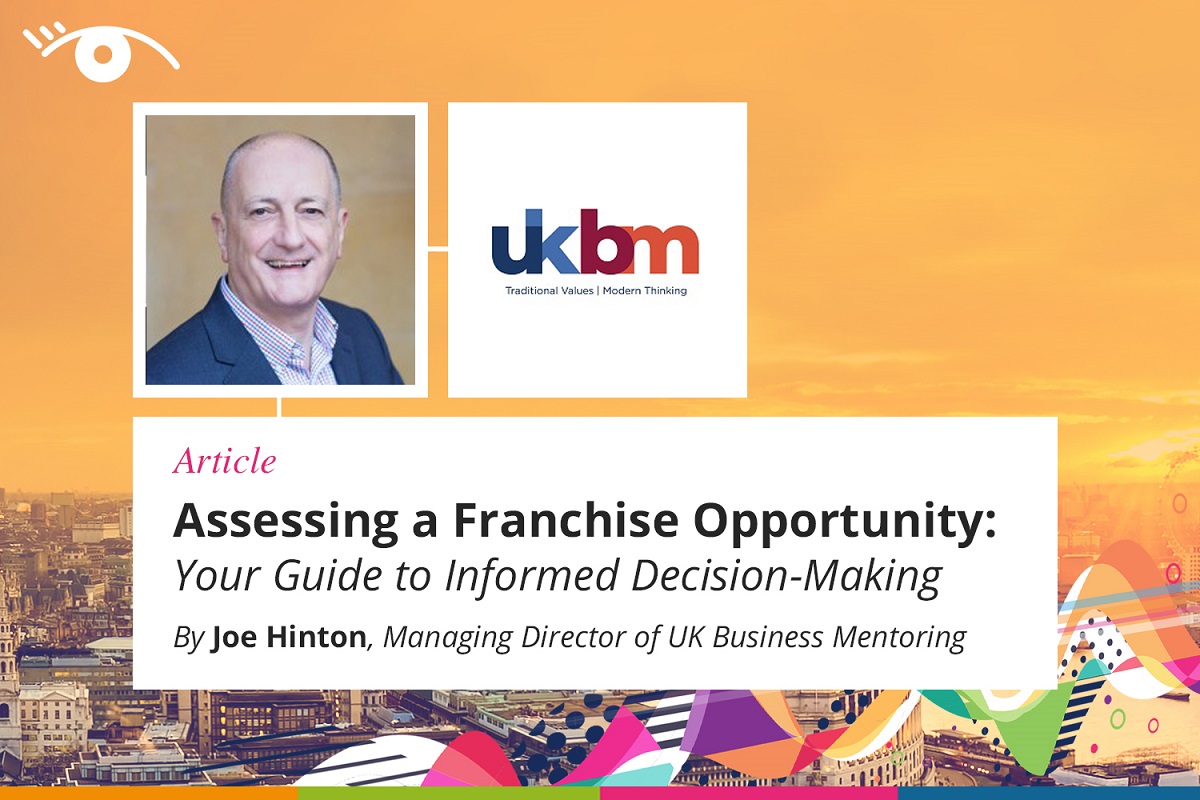
Investing in a franchise can be an exciting and potentially lucrative business venture. It offers the opportunity to become a business owner while benefiting from an established brand, proven business model, and ongoing support. However, before you dive into a franchise opportunity, it's crucial to conduct a thorough assessment to ensure it aligns with your values, financial capacity, skill set, and expectations. In this article, we'll guide you through the key steps in assessing a franchise opportunity.
1. Self-Assessment
Before you start evaluating specific franchise opportunities, take the time for some self-assessment. Determine your own values, goals, interests, and skills. What industries or types of businesses are you passionate about? What level of involvement are you comfortable with? Understanding your own preferences and limitations will help you narrow down your options. It is key that the values of any franchise you are considering fit with your own personal values.
2. Research Franchise Industries
Research various franchise industries to identify those that match your interests and skills. Consider factors such as market demand, competition, and growth potential. Conduct market research to assess the viability of the chosen industry in your target location. A franchise that operates successfully in one area may not perform the same way elsewhere.
3. Budget and Financing
Determine your budget for the franchise investment. This includes the initial franchise fee, working capital, and ongoing royalty and marketing fees. Evaluate your financing options, which may include personal savings, loans, or investors. It's essential to have a clear financial plan and secure adequate funding before proceeding. Remember a lot of businesses fail in the first few years because they are underfunded and run out of cash.
4. Review Franchisor Prospectus and Franchise Agreement
All good franchisors will have a prospectus which will give full information around all aspects of the franchise including its financial performance, fees, obligations, and the franchisor's history. They should also provide you with a copy of the franchise agreement which is a legally binding document, always take legal advice before entering into the agreement.
5. Talk to Current Franchisees
One of the most valuable steps in assessing a franchise opportunity is speaking with current franchisees. They can provide invaluable insights into the day-to-day operations, support from the franchisor, and the overall franchise experience. Prepare a list of questions to ask franchisees to gain a well-rounded perspective on what it's like to be a part of the franchise system.
6. Evaluate the Franchise Support
Assess the level of support the franchisor offers. This includes initial training, ongoing training, marketing support, and operational assistance. A strong franchisor should provide a comprehensive support system to help you succeed. If the franchisor's support is lacking, it could be a red flag.
7. Location and Territory
Consider the location and territory options available for the franchise. Evaluate the potential site or area for your franchise and ensure it aligns with your target market and customer demographics. Some franchises may offer exclusive territories, while others may have more flexibility in choosing a location.
8. Legal and Regulatory Compliance
Ensure that the franchise opportunity complies with all legal and regulatory requirements in your area. This includes business permits, licenses, and zoning regulations. Failure to comply with these requirements can lead to legal issues and potential business disruptions.
9. Financial Projections
Work with an accountant or business mentor to create realistic financial projections for your franchise. Consider various scenarios, including best-case and worst-case, to understand the potential return on investment and financial risks associated with the franchise.
10. Is Self-Employment right for you?
Becoming self-employed is a big change from being an employee, you need to be self-motivated, energetic and disciplined in your approach. In addition, whilst the benefits can be many, running a business undoubtedly brings a degree of stress and pressure and you need to be confident that you can deal with that. In the early days it can be very time consuming, working long hours and you need to be prepared for that and understand that this can impact on family time/life.
Conclusion
Assessing a franchise opportunity is something that requires careful consideration. By conducting thorough research, evaluating your personal values, goals and finances, and seeking advice from professionals and current franchisees, you can make an informed decision about whether a particular franchise opportunity is the right fit for you. Remember that choosing the right franchise can be the foundation for a successful and rewarding entrepreneurial journey.
Questions to ask a franchisor
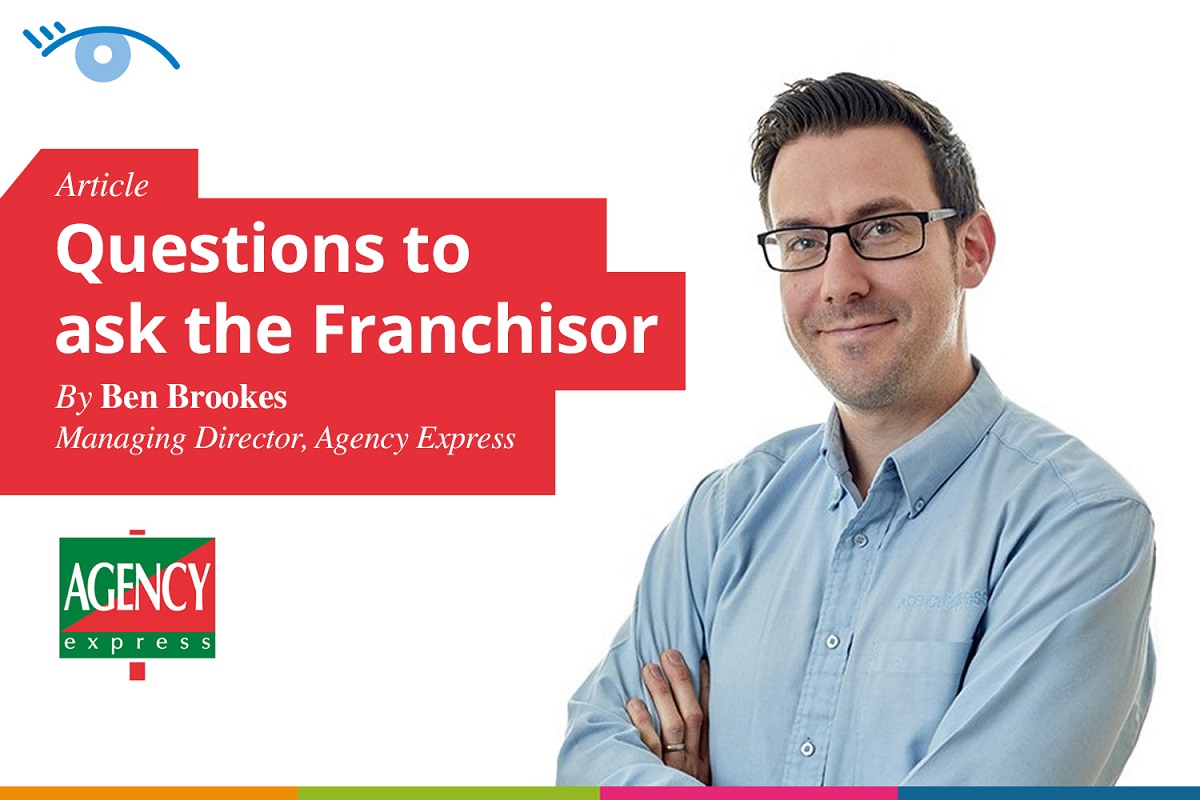
I’m constantly surprised by the yawning chasm of difference in terms of preparation that I see from prospective franchisees. One of the most important steps in your franchise journey is the first time you speak to your prospective franchisor, and you only get one chance to make a first impression.
Broadly, when I speak to people for the first time they tend to fall in to three camps; well prepared, underprepared, and not even vaguely prepared. So, before we get on to the questions you should ask, I’m going to give you the one you shouldn’t:
‘So, Tell me about your franchise’
There is nothing thar makes my heart sink as quickly as a prospective franchisee who has absolutely no idea about who we are and what we do. I am not expecting chapter and verse on the inner workings of our head office, but I do expect some basic knowledge of our franchise network and what we do – make sure you’ve taken time to make your questions specific and relevant.
A good franchise is like a good marriage – it should be symbiotic, and benefit both parties equally. Everyone involved should be invested both personally and professionally, and the first step of that commitment is doing your research and asking the right questions.
So what should you ask? This is far from an exhaustive list, but is a good starting point:
“Where was the franchise pilot operation set up? Is it still trading and owned by the company?”
The franchise pilot operation forms the basis of the business model you are investing into. You are going to replicate this business, and irrelevant of how long the franchisor has been trading as a franchise business, you want to know that ‘patient zero’ is still a success.
“What does the average day look like for a franchisee? What additional tasks do they have each week/month/year?”
You need to be sure that whatever franchise you are considering joining, the day-to-day task of the franchisee are realistic and achievable for your skill set. Just because the earning potential is great, or the end product is attractive does not mean the daily tasks are any more exciting or achievable for you – cut out the fluff, and get down to brass tacks.
“What are the costs involved?”
You need to understand not only the Initial Franchise Fee – which is the cost to join the franchise network, but also the ongoing Management Service Fee (MSF) which is ultimately how your franchisor will make their money. Make sure you question and understand any additional hidden costs that may catch you out such as marketing levies, software licensing or stock purchases.
“How many franchisees have you recruited in the last three years and how many have achieved their business plan targets? Can I speak with them?”
This question generates multiple useful answers for you. Firstly, the number of franchisees who have joined the network – if this number is very small, or comically high, you should ask why. A franchisor not able to recruit new talent to their network is not growing. Equally a franchisor recruiting a huge number per year may not be dedicating enough time to each new franchisee (or may have a ‘too good to be true’ offering). There is no right number, but it should be consistent, manageable and reflected in the number of support staff available for the franchisee to access.
Next, your franchisor should be giving you a fair and honest response as to how successful their franchisees have been. No franchisor has a 100% success rate; there will always be occasional failures, but they should be able to evidence their success and provide you with contact details of their successful franchisees for you to validate this.
Any attempt to deflect or divert you from speaking with franchisees should be a huge red flag.
“What does the training course entail and how long does it last?”
Think of this as like a 5-day intensive driving course – the instructor can not make you a brilliant driver in 5 days, but they can make you safe, competent and able to pass your driving test. You need to make sure you understand how long your franchise training course will last, what it will include and where it will be held. The more detail the better.
“What ongoing support will I receive? How regularly am I able to access this?”
All franchisees are different. Their inherent skills and attributes will be in differing areas, and its important your franchisor recognises what you are good at and where you need help. They should be ready and willing to help with all aspects of your new venture – sales, finance, IT, marketing, premises - but how often you can access this support may well be dictated by how many support team members there are for you to access – remember you are not the only franchisee they need to support. Make sure you know what support is available, how often you can access it, and most importantly if there are any additional costs involved.
“Why would a customer use your service/product? What makes you different?”
All franchisees are different. Their inherent skills and attributes will be in differing areas, and its important your franchisor recognises what you are good at and where you need help. They should be ready and willing to help with all aspects of your new venture – sales, finance, IT, marketing, premises - but how often you can access this support may well be dictated by how many support team members there are for you to access – remember you are not the only franchisee they need to support. Make sure you know what support is available, how often you can access it, and most importantly if there are any additional costs involved.
“I don’t have 100% of funds required to purchase the franchise. How can you help?”
Most franchisees will require finance to purchase their respective business, and the franchisor in question should have well established relationships for you to benefit from. They should be willing to introduce you to their finance contacts, and to assist you with the production and submission of your business plan.
“How will you help me to exit the franchise when the time comes? What is the average resale value of a business in your network?”
Many franchisees overlook the importance of thinking ahead – what happens when you wish to exit the network is just as important as when you join. Is the business a saleable asset? What can you expect in return? What fees will you encounter? Is there a buy back clause? Are there any restrictive covenants on exit? Make sure the Franchisor has given you a thorough explanation of the process of sale and expected returns.
“Who owns the franchisor business? What is the long-term plan for succession?”
Just as important as where your business will be in 10 years, you need to be comfortable the franchisor is heading in the right direction. Don’t be afraid to ask who is in charge, and what comes next when they wish to retire. Any franchisor worth their salt will have no qualms giving you their long term plan.
“What haven’t I asked you that I should have done?”
Give the franchisor the opportunity to tell you what you have missed – they will have had this conversation many many times, whereas you will have it only once. Lean on their experience and allow them to share with you angles and viewpoints you may not have considered.
Questions will differ depending on the brand or business type you are interested in – remember, there are no silly questions, only ones you don’t know the answers too. In my experience most franchisors are happy to wax lyrical about their business and will be more than happy to bend your ear for many hours after your questions have run out.
Take your time, write down the answers, and if you don’t understand ask again. Good luck!
Find out more about Agency Express franchise opportunities...
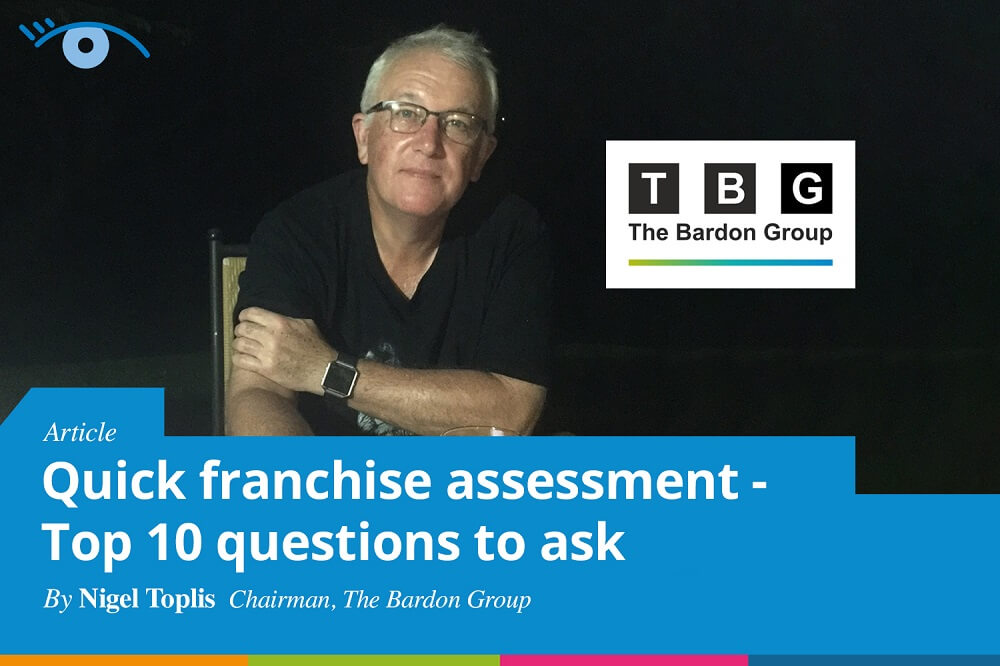
I have written numerous detailed articles about assessing franchise opportunities. It’s never easy to predict the future and no business is 'guaranteed' but the resilience of the specific franchise is critical.
I have distilled everything down to these 10 questions. The answers will at least objectify your ‘gut feel’.
- Are they members of the British Franchise Association?
- How long has the business been going (longevity is generally a good sign).
- What’s support like from the franchisor?
- Do they proactively cover marketing, training, operations, finance and provide visual support in these key areas of the business?
- Does the Franchisor have real people available - not just 'telephone support'.
- Does the business have multiple income streams? - or is it reliant on one product or service?
- Does the Franchisor make most of their money through on-going royalties based on franchisee performance (my favoured) or mainly through recruiting new franchisees?
- Does the Franchisor have a history and reputation for introducing new products to their network?
- What do the last 3 years Franchisor accounts tell you?
- Do you feel the industry is robust and is there a big enough market in your territory?
- Do you have confidence that this franchise can successfully access the market?
My final piece of advice is to speak to a selection of franchisees and get their ‘take’ on the franchise, the franchisor and the level of support.
And lastly, good franchising is a marriage and the relationship between franchisor and franchisee is critical SO decide if you like the franchisor and their team and can visualise working with them.
Article by Nigel Toplis, Chairman of the Bardon Group. Franchise oppotunities for Techclean and Recognition Express.
More questions to ask the franchisor
whichfranchise has outlined a list of key questions we believe would be beneficial to ask a franchisor. When looking to buy the right franchise for you, you must have confidence in the franchisor you choose and ask them questions about their business and the structure of their organisation at the early stages.
Below are some questions to ask before buying a franchise to help you assess the opportunity. Please bear in mind that there are many types of franchises and you may have to tailor these to suite specific franchise models.
- What is the background of all the directors? Have they got franchising experience? Why did they decide to go down the franchise route?
- Are they financially sound? Have they ever been bankrupt?
- What is the total cost to buy a franchise? Will you supply me with a breakdown of all costs necessary to open the business? What are these costs?
- Are there any other costs I can expect to be asked for after I open the franchise? Do I have to contribute to any other costs such as advertising and promotional expenditure that you incur, if so how much?
- Do you charge ongoing franchise fees and if so what are they and how are they calculated?
- Do I have to pay a deposit or upfront payment, and if I do not proceed will I lose my deposit or any part of it?
- How much working capital would I need, and what help can you give me in estimating my projections?
- What is my expected break even and how long should it take me to reach this figure?
- How long will it take to start trading from the time I sign the contract?
- How thorough is the training at the start-up stage and thereafter? What will the training consist of and how long will it last? Are all training costs included in my franchise fee?
- What help, if any, will I receive if I want to do some advertising and promotion on my own?
- What ongoing support am I provided with?
- What help and guidance do you offer in site selection?
- Do you provide instructional and operational manuals and can I see them prior to signing?
- Can I be provided with a full list of all franchisees in the network and can I contact them?
- How many franchisees have you opened in the past 12 months? How many do you plan to open in the next 12 months?
- How successful is the franchise and the existing franchisees? Can you tell me about the best and worst performing franchisee?
- How thoroughly do you vet prospective franchisees to maintain a high standard in the network? How many do you reject?
- Have any franchisees failed, and if so why?
- How do you handle grievances with existing franchisees?
- Will the territory offered be for my sole and exclusive use?
- Are you currently operating in areas with similar demographics as my proposed territory?
- Does your company see any threats in the current marketplace?
Though this is a good array of questions to ask when buying a franchise business, it is not an exhaustive list and so you should expand on any areas you wish more clarification on.
Talk to existing franchisees
It is vital when doing your research that you speak to existing franchisees in the network – they will be your most useful source of information and franchise advice. A good franchisor will always give you access to ANY of their franchisees.
If they are reluctant for you to do this, or only give you several names to contact, then they probably have something to hide; you can bet that the names they give you will be of their best achieving franchisees.
Why is it important to speak to franchisees while I am researching a franchise business?
Franchisees have been there and done it, and so will tell you as it is. It is good to speak to those who are successful and also any that are not doing as well.
If it is a good franchise then you will be able to identify why franchisees may not be doing as well - it will usually be down to personal circumstances. If, however, a pattern starts to emerge and a lot of franchisees are giving the same reason for their poor performance, then alarm bells should start ringing.
Get in the franchisee's shoes!
You can also ask to shadow a franchisee for a day. This will allow you to see what a typical day in the life of that franchisee is like, allowing you to see if it is something you would be interested in.
The franchisor should be able to arrange this for you. Franchisors may also allow you to speak to any franchisees that have left the network to give you an idea as to why they left. Again from this you should be able to get a better idea of how good the franchise is.
Potential questions to ask when buying a franchise business can include:
- What was your reason for choosing this franchise? And what USP’s does it have over its’ competitors?
- Where you happy with the support you got at the launch of your franchise? What support did you receive?
- Have any problems occurred for you? If so, how did the franchisor deal with these? Overall is the franchisor supportive and available if you need advice?
- How does the franchisor manage change in the business? How do they implement change? Is sufficient training and support given?
- Does the franchisor visit you often? Is the operations manual and other supporting support documents well written, comprehensive and easy to follow?
- Does the franchisor welcome feedback and ideas from franchisees? Have any ideas been implemented? Do franchisees have any say in the running of the business?
- How does the franchisor market the business? What marketing do you specifically receive? Is it sufficient?
- What are you sales figures like in comparison to the company as a whole? What is the company’s weekly, monthly and annual sales figure typically like?
- Are your ongoing fees reasonable? Is what you receive in return sufficient?
- How much did you pay for the business? How much working capital did you require? Have you had a return on your money yet? If not, when do you forecast you will?
- Are you allowed to buy multiple territories once you have built up your first franchise?
- If you were taken ill and couldn’t work, what help would the franchisor provide?
- What changes have you seen in the business since you have been there? Have these been positive changes?
- If you could change anything about the business, what would it be?
- Would you do it all over again if you had the opportunity?
This is not an exhaustive list of questions to ask when buying a franchise, but it gives you a good start to what you should be asking the franchisee. Other questions may arise depending on what they answer.
The answers will help you to build a picture of the franchise and at the end of it you should be in position where you either want to continue with applying for this franchise opportunity or have decided to look elsewhere.
Evaluate the franchise market
If you are buying a franchise opportunity, you are going to be working, selling and promoting the product or service for a long period of time. You can’t change or develop the product or service, so make sure that the franchise has long term appeal and its market is not threatened in any way.
It is important that the franchisor can demonstrate a clear understanding of the future market for the product or service and that you both clearly understand the following.
Is the market for this product / service expanding rapidly, growing slowly, static or declining?
Notes to consider: The more advertisements you see for the product or service now than a couple of years ago can give you an indication of the state of the market
Does the product / service have special features which help it to sell? Does it warrant a premium price?
Notes to consider: In order to make money for the franchisee and franchisor, the product has to have real advantages over competitors. It may be difficult to maintain premium prices if the product or service could be easily copied by others.
Who would your competitors be and how competitive would your product or service be in relation to them?
Notes to consider: Do competitors have any technical or price advantages? Could you improve on the service offered? What is their level of advertising? If there are no competitors ask yourself why there are none.
You have looked at the general market for your product, what do you know of the local market in which you will be operating?
Notes to consider: Does the local market have the same characteristics as the market in general? Is the product particularly suitable for your area? How dependent is success of the business on particular lifestyles or levels of income?
How to avoid franchise pitfalls
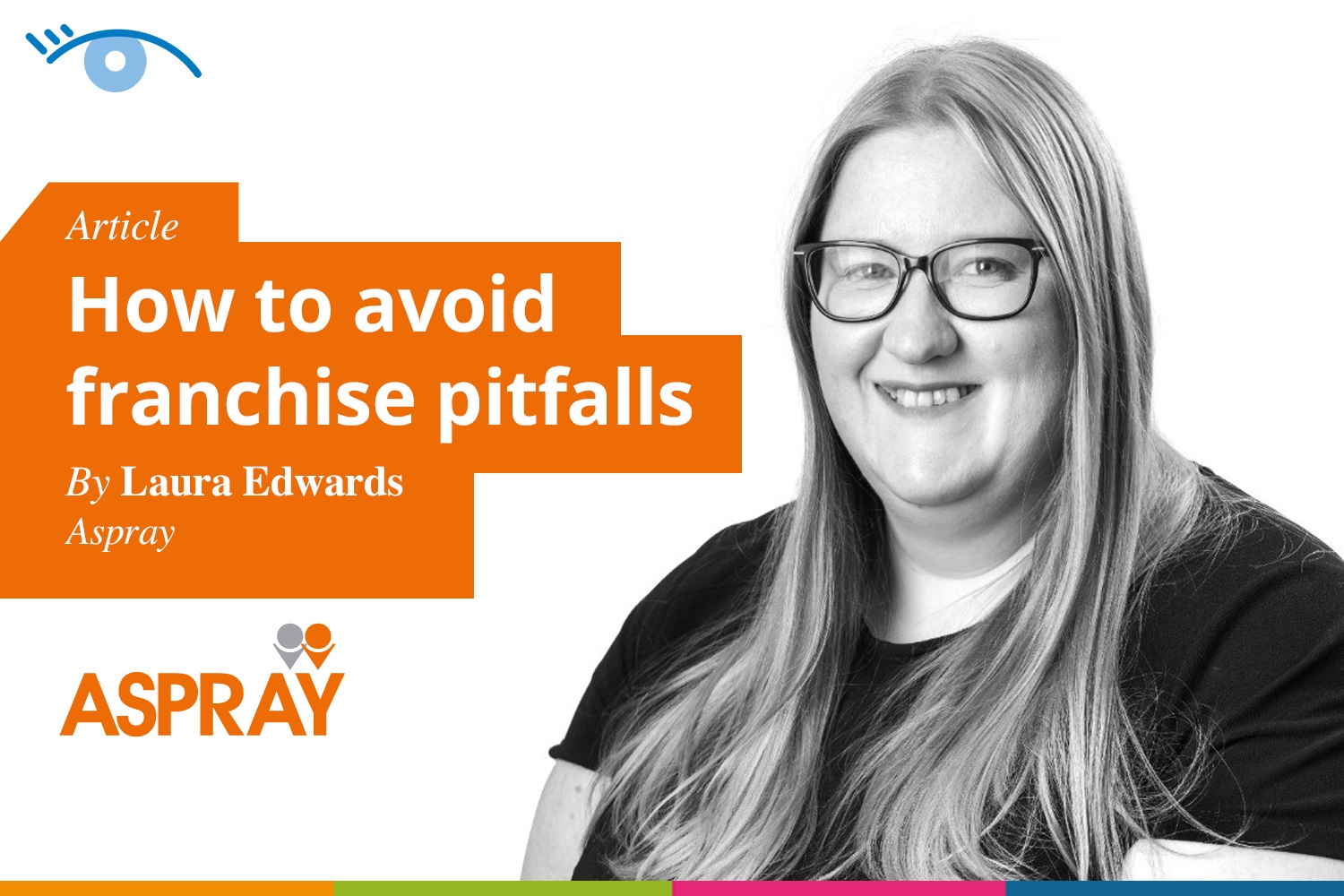
Do you know how to spot a pitfall in a franchise? Or how to determine if you’re buying into an ethical franchise?
As a prospective franchisee it is essential to know what you should look out for when investing in a franchise and how to avoid buying into a franchise that isn’t for you. In this exclusive article, Laura Edwards, Aspray share their expertise:
Research, research, research!
Before you dive into a huge financial commitment it is vital to gather as much information as possible to help towards a fully informed decision. Remember… do this before you’ve handed over your money! The simplest way to research the franchise is typing in the company name on a search engine to discover the industry and the service that they offer.
Any concerns that you may uncover during research, you should write down to discuss with the franchisor in the early recruitment stages.
Look for franchises who are members of the bfa
A great way to start your initial research is looking only at franchises that are members of the British Franchise Association. “The bfa is the voluntary self-regulatory body for the UK franchise industry, with a standards-based approach to membership.”
In order to gain a full bfa membership franchises are tested against the structure of their business, relationship and support between the franchisor and franchisee, their system and finally their success as a franchise.
You can be assured that franchises who are bfa members are committed to the principles of ethical franchising and their business model has been examined. Being a member of the bfa is also favoured by many high street banks and prospective franchisees are more likely to secure the funding they require for success.
Talk to the franchisor
Top franchisors will provide you with an in-depth insight into their business model before any form of payment is taken. An ethical franchise will be honest about the work you will have to put in to reach your target earnings. On the other hand if franchisors offer a ‘get rich quick’ attitude, it is more than likely too good to be true.
It is important to take it slow and don’t rush into (or be pushed into!) buying a franchise based on instant income which will more than likely turn out to be a false promise.
Study the recruitment process
Buying a franchise is not as simple as handing over the franchise fee and signing the agreement. Top franchises have rigorous recruitment processes in place to make sure they choose the right person for the territory.
Top franchises will have several steps within the recruitment process in order to protect their business integrity and maintain the high standards of chosen franchisees. On the other hand if a franchisor is pushing you into buying a franchise with limited information provided, this could be a warning sign of a franchisor who just wants your money.
Talk to existing franchisees
Top franchises will offer you with the chance to speak to existing franchisees in the network. Talking to franchisees already in the network can be a valuable experience as they have been in your position.
They can be honest about the positives of the franchise as well as the barriers you may face. If franchisors don’t allow you to speak to any existing franchisees, they may have something to hide and buying into this could be a mistake.
Check the franchise agreement
The franchise agreement should cover all aspects of the business. It would be beneficial for you to hire a franchise lawyer to check the agreement before any decisions are made.
Speaking to a franchise lawyer would be beneficial as they understand what to look out for and can point you in the right direction.
When you are considering purchasing a franchise, these steps can help you to avoid pitfalls and help you avoid franchises that don’t meet your needs.
What training and support does a good franchisor offer?

Before signing on the dotted line and joining a franchise business, there’s a key area that franchisees should ask about: training. It’s not enough to simply receive an induction and then undergo your business venture. Training should be a constant throughout your entire franchise journey to stand you in excellent stead to be successful and profitable.
As your business evolves, the support you require from the franchisor changes. A good franchisor will help you to map out your business journey and reflect the various stages with appropriate training. And as the franchisor adapts to meet changing market conditions and customer needs, there should be support for you to do the same.
You should look for the following when considering the training and support offered by a franchisor:
Initial training: Early on in your franchise journey you should receive an in-depth induction. This should introduce you to the support available and those at headquarters who are there to help. It’s key to learn in greater depth what the brand’s values are and how that determines processes, from marketing to finance to customer service.
Support as you expand: Once you’re well-established and picked up the pace, it can sometimes feel difficult to keep that momentum going. If you have bought a new franchise, it might have taken a little while to get it established, and now you’re keen to make it a more profitable business, build your team, and take on more clients. With consultative advice from the franchisor and others in your network, you can get the wheels turning faster and take your business to the next stage of growth.
Additions to your service: Often growth can be spurred on by adding new service offerings from your chosen franchise brand, and it’s important that you’re offered the tools to make that a success. At Home Instead, franchisees can offer additional services such as specialist dementia care, healthcare and live-in care after operating for a given amount of time. National office works with the franchisee and their team to teach them how to equip care professionals with the skills to deliver this specialist care. A new service could mean the potential to attract new customers, so it’s also key to receive marketing guidance on how to make the most of this new addition.
Changes in the overall business: Whether it’s changes to the board of directors, a new marketing campaign, or a rebrand, the franchise business will continue to evolve. You should be kept informed so that you and your franchise can get the most from these strategic decisions. Don’t just ask about weekly newsletters sent to the franchise network; ask about events, webinars and annual conferences that keep you clued up on what is happening on a bigger level.
Home Instead’s annual conference brings the whole franchise network together. It rejuvenates the network, gives them an update on the mission, and gets franchisees excited about the roadmap ahead. It enables franchisees to know what goals they should work towards, helping the overall franchise business and each owner to achieve to the highest level within the network.
Article provided by Luke Spellman, Franchise Development Manager at Home Instead UK, the no.1 home care franchise. Read more about Home Instead Franchise Opportunities....
What support will a good franchisor give you?
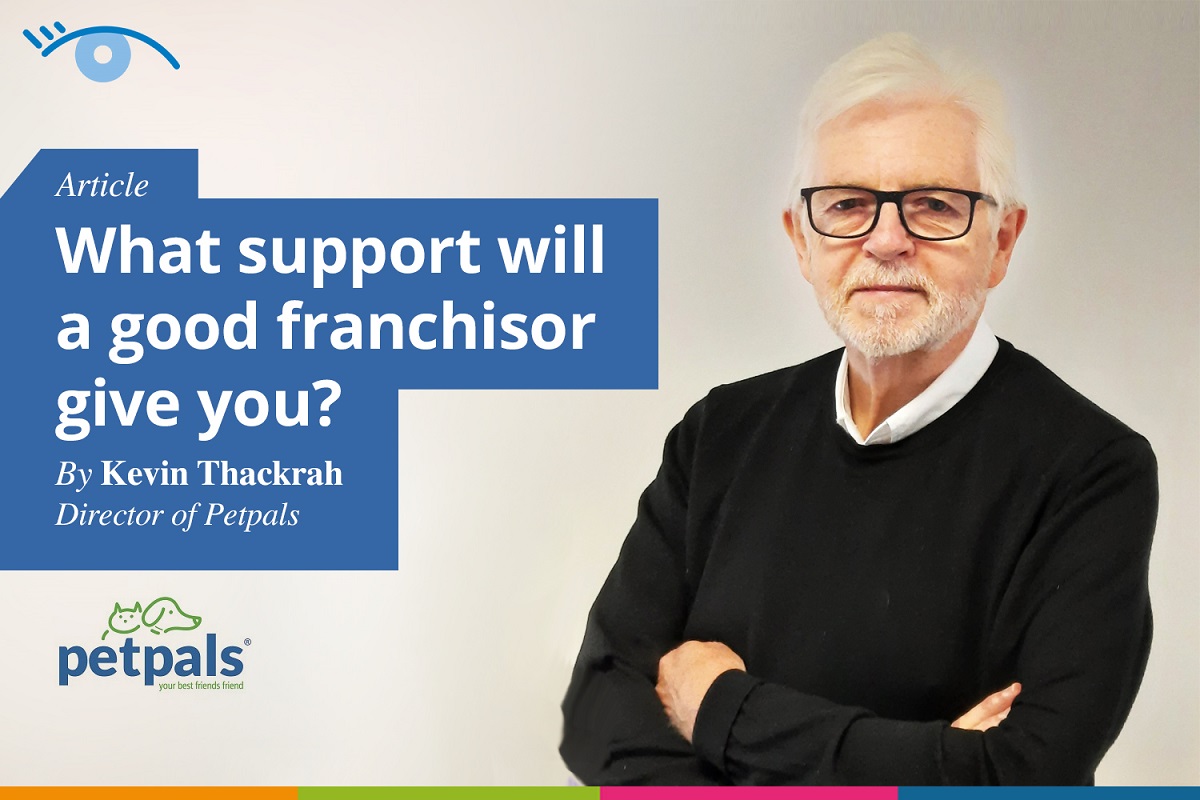
Ongoing expert support is essential for franchisees, along with a proven business structure that fosters successful operations and growth. Without such support, both franchisees and the overall quality of the services they offer may suffer. Petpals, the UK’s longest-established national pet-sitting and pet-care franchise, places a strong emphasis on the care and prosperity of its franchisees. It focuses on empowering franchisees to establish profitable businesses that benefit their communities, including their staff and the pets and pet owners they serve.
Whatever the size of the business, the back-up and support franchisees receive from their franchisor should be the same. From the initial launch to ongoing marketing and PR and regular in-territory visits, an experienced franchisor will be able to help and support a franchisee to grow their business to the size they desire.
Involving franchisees in support developments
A franchise opportunity in any sector should not be launched without effective systems and processes already in place and tested through pilot franchises. Implementing a franchisee-led forum enables the identification and resolution of any common issues in the franchise network, providing support and solutions to franchisees. Valuable insights from franchisees help pinpoint challenging areas where support is needed. Even with a large franchise support team at head office, it’s impossible for a franchisor to pre-empt every eventually, so granting the network a platform to express their opinions and empowering them to propose solutions is imperative.
Network-wide gatherings, such as an annual conference, serve as an ideal opportunity to discuss and tackle widespread issues in the sector as a whole and share best practices. By actively listening to franchisees and supporting them throughout their journey, both their businesses and the franchise brand’s strength and reputation will reap significant rewards.
Support for the life of your franchise business
As a leading franchisor in the pet-care industry, it is crucial for us to prioritise the success of our franchisees. By providing comprehensive support and guidance during a franchisee’s business launch and throughout their journey, we establish a solid foundation for their growth and prosperity. The positive outcomes of this training and support extend beyond individual franchisees, as their accomplishments contribute to the brand's wider reach, attracting more aspiring franchisees and ensuring the long-term success of our franchise.
In the competitive franchising landscape, it is vital not to overlook the achievements of established franchisees. They form a diverse and essential part of a franchise's success, and remaining committed to their continuous development ensures they feel as supported as newer franchisees. At Petpals, we take great pride in celebrating the collective triumphs of our expanding network of franchisees, who serve as shining examples of how determination and hard work lead to remarkable achievements.
A culture of support extends to customers
It is the responsibility of a pet-care franchise to educate pet owners about the benefits of responsible pet ownership and advocate for animal welfare. Petpals’ incorporation of its comprehensive values and ethics makes the franchise opportunity stand out. From day one, committed individuals will be immersed in the Petpals winning culture, so they can achieve the high standards that customers have come to expect of the Petpals brand.
Our duty as a pet-care franchise to educate pet owners about the benefits of responsible pet ownership, advocate for animal welfare and build a sense of community among pet owners is present in every part of our franchise model. Recruiting people with a passion for animal welfare means our responsibility to the industry comes from both franchisees and our head office team.
Franchise agreements - ignorance is not bliss!
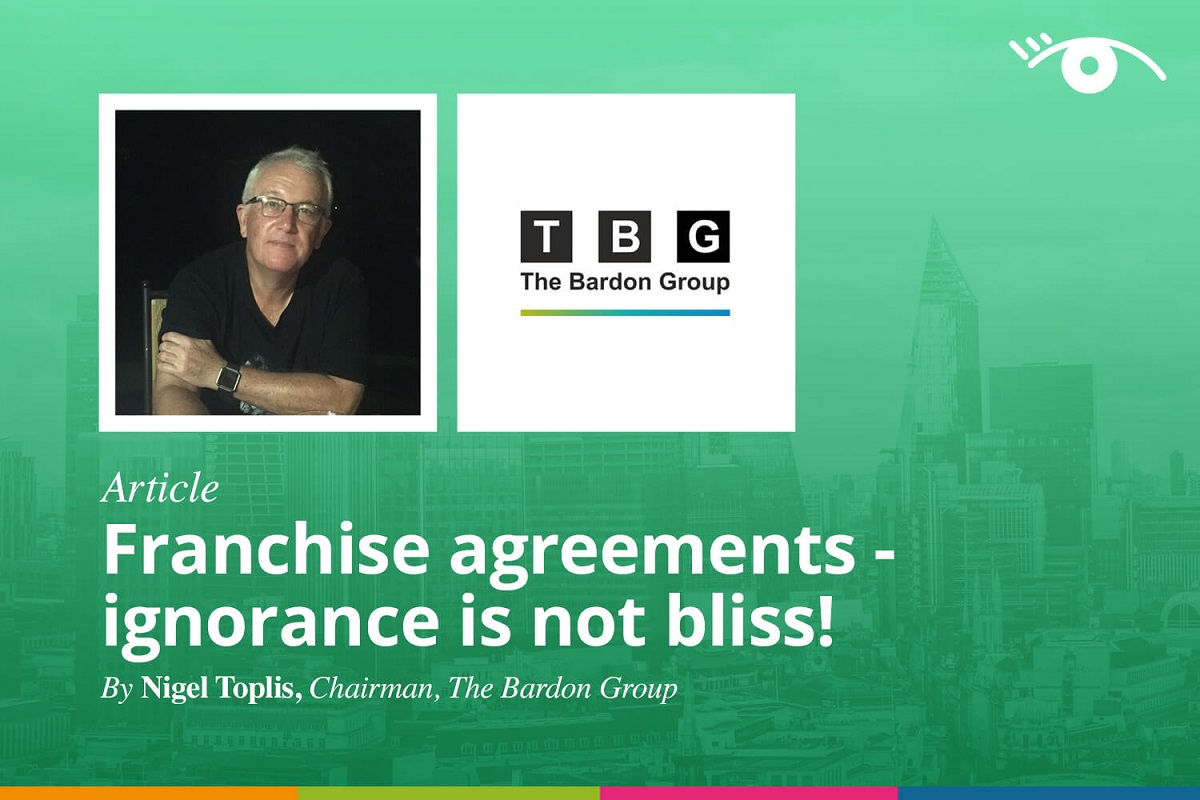
A franchise agreement is a contract – you need to be aware of your responsibilities.
It is critical for franchisees to understand the essence and responsibilities of and in the Franchise.
Yes, it is a contract BUT more importantly the franchise agreement lays the ground rules – the very foundation - for the future relationship between franchisor and franchisee.
Marriage
I’ve often said that a successful franchise is a marriage with the franchisor and the franchisee bringing different skills to the relationship but working as one with a common objective of business success.
Trust, respect and a shared vision all help to create a common bond between franchisor and franchisee.
However, to ensure such mutuality you need to base it – from the beginning – on the clear knowledge and understanding of each party’s specific responsibilities.
Responsibilities
The franchise agreement details said responsibilities clearly for both parties. It sets out in detail the contractual terms, conditions and obligations of both the franchisor and the franchisee. It sets down the rules of the game and the franchise agreement is also the basis of the formal relationship between the two parties.
Objectives
A franchise agreement has three fundamental objectives:
- to set out the terms and conditions of the arrangement between franchisor and franchisee.
- to protect the franchisor’s intellectual-property rights
- to specify the ground rules for operating the franchise units.
As with any contract both sides need to follow the rules and if they do so then it will be a happy and successful marriage. Consider it a pre-nup! Problems only arise when either side breaks the rules.
Time
The franchise agreement is often quite lengthy and will cover a whole plethora of conditions surrounding the running of the franchise, but, as with most contracts, in a good franchise system people seldom refer to the franchise agreement until the contract period is coming to an end.
As a franchisee, you need to ensure that you have enough time to both reap adequate reward for your efforts and to sell on a valuable capital asset.
Often current franchise agreements will provide an option to renew – and certainly with The Bardon Group companies we provide this option for no additional fee – thus giving you the option to either sell on OR to extend your relationship.
We have 10-year agreements with an option to continually renew. Other franchisors will have a different time length.
Mutuality
Franchises work because everybody rows the boat in the same direction and every franchisee has the same opportunities, rights and obligations.
To this end every franchisee should sign exactly the same franchise agreement and you should be cautious of the franchisor who is willing to change theirs simply to suit the needs of prospective franchisees. If you and your solicitor – who must be experienced in franchising matters – cannot accept the franchisor’s standard agreement, then you should look elsewhere.
Anchor
Ultimately the magic of franchising is that it combines the knowledge, drive, ambition and individual skills of franchisees with a proven business system, ongoing corporate support and professional guidance of the franchisor to hopefully create a successful business venture for both parties.
The purpose of the franchise agreement is to act as an ANCHOR to that relationship by detailing the elements required to make the magic work.
Of course, the franchise agreement can lay down the rules, provide the parameters and document the means of working together. However, it cannot detail the most important attributes of a successful relationship - Attitude, honesty and integrity.
About Nigel Toplis
Nigel Toplis is Managing Director of The Bardon Group stable of franchises which includes Kall Kwik, Recognition Express and Techclean. The Group specialises in developing and growing franchised businesses in the UK.
How to avoid franchise scams
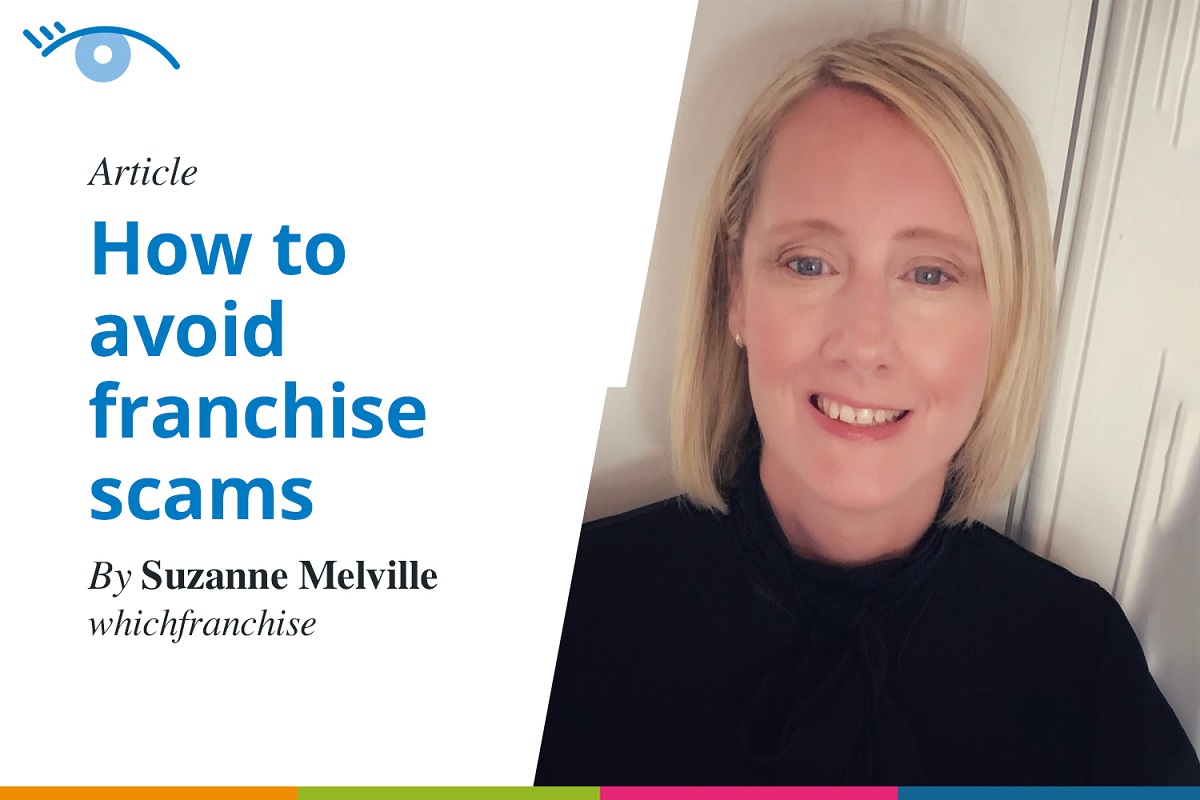
In the UK there are hundreds of businesses that call themselves franchises. However, despite promoting themselves as one, they are not all technically franchises
With this in mind you need to know what to look out for when considering buying a franchise; how to spot a good franchise from a bad franchise. In this article we provide you with ten areas you should focus on and questions to ask before buying a franchise.
Are they a bfa member?
A good starting point would be to look at only those opportunities who are accredited by the British Franchise Association (bfa); this is the body that represents franchising in the UK. Not all franchises promoted on whichfranchise are members of the bfa. However, even if the franchise is a member of the bfa, you still need to do your homework and take as much franchise advice as possible, as being a member does not automatically guarantee success nor does it mean the franchise business won’t fail.
Have you spoken to the franchisor?
Talk to the franchisor, a good franchisor will be happy to tell all and give you a good insight into their business. They will tell you about their ups and downs, challenges faced and overcome and will be happy to disclose any mistakes/failures they have made in the past.
A good franchise will have used a trial period to identify these errors and would have worked hard to overcome them. However, be wary if someone tells you that their franchise is perfect and they have done no wrong, this is very rare.
Do they promise you immediate riches?
You should equally have alarm bells ringing if they tell you that they can make you rich over night. This will never happen. An ethical franchisor will not make promises to earnings but may give you predictions based on other franchisees in the network; consequently managing your expectations.
Do they pressure you into buying their franchise?
Never be rushed into buying a franchise. If someone is constantly harassing you to make a decision then simply walk away. Finding the right franchise to buy is a massive decision as well as a massive investment. You need to do a lot of due diligence which any good franchisor would understand and recommend.
They would be happy to give you all the time in the world you need to make the right decision for you and for them. If someone is pushing you into a decision and not open to talking about the company, it is more likely than not that they will have something to hide.
Do they answer all your questions?
A franchisor should also be able to answer any questions you throw at them about their business. Make sure you have a prepared list of questions to ask when buying into a franchise. The franchisor should know the business inside and out and so should not falter at any questions you ask.
If they cannot answer immediately, then they should be looking to get back to you ASAP.
Do they use gimmicks to sell their franchise?
Also be suspicious of any special promotions a franchise is running. A good franchise’s track record would speak for itself; they wouldn’t need any fancy gimmicks to sell their franchise. You can be sure that the cost of any freebies you think you are getting will be added on somewhere else in the package. Or there is a reason it is free.
Are they a new franchise?
Every franchise is new at some point, even McDonalds started off as a one unit franchise, and so you shouldn’t be put off if a company is new to franchising.
You should be aware though that the risks will be higher when buying a new franchise as it is less established. Check the history of the company itself; this should give an indication to the type of business it is. If the business is new then they shouldn’t be franchising; you cannot make a franchise successful if the business has not proven that it can be successful.
Only established, thriving businesses with a proven track record in their market should look at franchising. You need to therefore also avoid any “franchises” that have no company owned outlets as this is a franchise scam.
Do you get a return for your investment?
Make sure that what the franchisor is asking for in fees is worthy of what they offer you in return. The more established a franchise is, the more they will ask for as they will be able to give more back in return, i.e. public acceptance, market awareness, dominant position in market etc.
Watch out for those who ask for a high investment but offer nothing in return, i.e. no track record in their industry, as they are just looking to make a lot of money fast.
Does your franchise fee cover initial training and support?
The franchisee fee you pay should also cover support. Make sure that the franchisor has a dedicated and complete support system. If the support is limited or non-existent then this is something to be concerned about.
It is worthwhile seeking money advice and planning advice from your accountant to make sure that you can afford the franchise and have sufficient funds to cover the actual cost of running the franchise. Sometimes you may think you know the actual cost to buy a franchise but does it include the ongoing fees, working capital etc. Your accountant should be able to help with this, also ask the franchisor out right, how much does it cost to buy a franchise from you.
Do they provide you with a full list of franchisees?
A good franchisor will provide you with a full list of all their franchisees that you can speak with, not just one or two they have selected, who you can be assured will be the best performing franchisees in the network and may not tend to be a true representation of the system as a whole. You should be offered the top and bottom performers to speak to. Also ask how many have left the system and if you can speak to them.
We cannot stress enough how important it is that you do your due diligence and take the right franchise advice (money advice from your accountant and franchise legal advice from an experienced franchise solicitor) so that you are 100% certain that it is the right franchise for you, and one that is reputable, before looking to buy it.
If you are in any way in doubt about the franchise opportunity, then there is probably a good reason for this so maybe best to walk away.
Franchisee Training For Success
One of the main advantages of joining a franchise is the level of training which is provided by the franchisor. It is in the franchisor’s interests to ensure all franchisees are thoroughly and properly trained so they have the best chance at succeeding in their new business venture.
Papa John’s, like many major franchises, has a set-up which is arranged as a win-win situation: so, the more product (in our case pizza) our franchisees sell, the more profit they make and in-turn we do better as a franchisor. Success comes down to having excellent systems in place, a superior product, great service and the best people but, most importantly, detailed and thorough training. Every aspect of the enterprise including all processes is covered within franchisee training this means everyone knows how to deliver our product and service perfectly each time and every time.
Franchisees come from all walks of life and have varying experience. Some new franchisees may already be proficient at certain aspects of running a business. Perhaps they have been self-employed in the past or they might not know the industry but have had experience in managing staff. This will undoubtedly be an advantage, however, it is any franchisor’s role is to ensure everyone is up to speed so they can start work from the same base-line. Training for a typical franchise will usually cover products, customer service, processes, marketing, accounting and staff training.
Compare this approach with starting up a new business from scratch. There is a steep learning curve when starting any new enterprise, however, it is much more efficient to learn through training than from expensive mistakes which is almost inevitable when starting up alone.
At Papa John’s we provide a detailed franchisee training programme. Regardless of franchisees’ backgrounds or prior experience, with the right attitude and our correct and thorough training, backed-up by world-class service and product, all the ingredients are in place for anyone who is motivated and determined enough to create a successful franchised business.
The training franchisees receive ensures they will be ready to run a Papa John’s store from day one of opening is detailed and hands-on. It includes six weeks in total – half in-store plus plus three weeks at Papa John’s headquarters. Franchisees need to complete a specified number of hours in-store to gain accreditation to open their own outlet. However, our training doesn’t finish there. On store opening, Papa John’s head office staff work alongside the franchisee initially to help with any hands-on training – particularly of staff - which may be needed during the initial stages.
New staff attend our Milton Keynes HQ and specialist training facility and training takes place while the franchisee’s store is in the fit-out stage. Our operations support team will continue to work with the franchisee and their staff within the newly fitted store environment to give continued training until they are confident and ready to open for trade, this additional support/training is usually between five to seven days post fit out.
Like many franchises Papa John’s and the pizza industry really is a people business! We know happy people make the best pizza! Therefore, we aim to recruit franchisees who get on well with others but who are also as dedicated and passionate as us and able to adapt to a proven way of working. The desire to roll-up sleeves up and get stuck in, which means everything from making pizza through to managing staff, goes a long way! The best franchisees are organisers with a can-do attitude – they are people who get things done. The role can be incredibly rewarding for the right person.
These qualities represent those of many who are successful in business. However, without the right training and learning the best way to tackle processes to deliver a top quality product to customers from those with many years’ experience there is far less chance of success. Papa John’s training programme is our investment in the success of our franchisees’ stores and for the future of our business a as a whole.
The role of brand and longevity in franchise success

Are you considering taking the leap into the world of franchising? As you embark on this exciting journey, remember that first impressions matter. In business, that initial impression is heavily influenced by brand awareness. A brand encompasses more than just a logo, jingle or colour scheme – it embodies everything consumers know and believe about a business and the experiences they anticipate having.
Franchising presents several advantages, one of which is the opportunity to align with a nationally recognised brand. In fact, the brand is arguably the most vital and influential component of franchising. However, it is crucial to acknowledge that building brand awareness is gradual. As a prospective franchisee, you must identify a franchise that has endured over time – thanks to the stable demand for its services and the experienced support it provides to franchisees. Here, Kevin Thackrah – director of the UK’s longest-running pet-care franchise – discusses the importance of aligning yourself with a well-established brand and its effects on business.
Consider your favourite products and services – each one represents a brand with strong recognition. You likely remember their brand names easily. Essentially, a brand is a commitment shared between a business and its customers. To the business, it is a pledge to consistently provide high-quality products or services as promised wherever they are in the UK – and in the case of a franchise brand, whichever franchise location delivers them. When you are a customer of a franchise, you anticipate what they will deliver, and it is this reliability that makes many franchises so popular and successful. Your favourite brand is your favourite because it typically fulfils its promise to you.
Brand awareness is a significant advantage that potential franchisees should consider when learning all about franchising. They inherit it when opening their own franchise business – for example, businesses like ours at Petpals, which has been operating since 2001. Over the years, we have diligently crafted a proven business model that diminishes the risks associated with starting your own business and establishes a reputation that helps attract and retain customers. Opting for a well-established brand like Petpals provides franchisees with robust foundations that pave a swifter path to profitability – making it an attractive option for aspiring entrepreneurs seeking a promising and less risky business endeavour.
Beyond the mere name recognition and longevity of the brand, here are several key aspects that franchisees can benefit from when they join an established franchise.
Uniformity and brand consistency
Investing in a recognised franchise brand extends far beyond merely adopting a business concept – it involves becoming part of a meticulously crafted image and reputation. When you join a franchise like Petpals, you gain access to a proven system and inherit the trust and credibility that have been painstakingly built over time. Uniforms bearing the franchise logo, like those provided to Petpals franchisees, represent your dedication to upholding the highest standards of service. More than attire, they become a symbol of trust in the eyes of your clients – fostering customer confidence and helping you distinguish yourself from independent competitors who may lack the uniformity and brand recognition that come with being part of a recognised franchise.
Insurance and peace of mind
Entering the world of entrepreneurship, even within a well-established franchise, inevitably carries a degree of risk. Nevertheless, aligning with a reputable brand bestows a unique advantage – access to comprehensive insurance packages. These insurance offerings are not just a checkbox – they are a lifeline, providing franchisees with invaluable peace of mind. Knowing that you have robust financial protection in place, ready to support you in the face of unforeseen challenges, can be a game-changer. At Petpals, we go a step further by tailoring our insurance coverage specifically to the intricacies of the pet-care industry, ensuring our franchisees are safeguarded against the unique needs and potential risks within our field.
Credibility through checks and standards
In pet care, pet owners entrust their furry friends to your care, and that trust should not be taken lightly. Here is where the strength of franchising shines. Established franchises, like Petpals, have well-defined procedures for conducting DBS checks, ensuring that their employees and franchisees meet the highest standards of integrity. As a franchisee, undergoing this rigorous screening process bolsters your credibility and assures clients that their beloved pets are in the safest hands possible.
At Petpals, we are members of the Pet Care Franchise Association and the British Franchise Association – underscoring our commitment to professionalism and ethical practices. Aligning yourself with a franchise belonging to these associations signifies your dedication to upholding industry standards, providing prospective clients with an added layer of confidence in your services.
Trust
As a business owner, your capacity to cultivate and earn the trust of your customers is the distinguishing factor that sets you apart from your competition. When executed effectively, this trust-building process lays the foundation for a loyal clientele, a client base that not only returns but also becomes an advocate for your services, potentially resulting in more referrals and increased revenue. However, trust does not materialise overnight. Studies have indicated that it typically takes around two years for customers to develop confidence in a brand or, more precisely, two years for them to perceive your brand as one they can rely on*. Building this trust involves consistent effort, dedication and, most importantly, time.
When you align yourself with a franchise with an existing position in the market, the years of painstaking groundwork required to establish a trusted brand name have already been accomplished for you. This inherent trust not only jump-starts your journey as a franchisee but also accelerates your ability to earn the confidence of your customers, enabling you to enjoy the benefits of a trusted brand from the very beginning.
When considering franchise opportunities, do not underestimate the power of an established and recognisable brand. It can provide instant credibility, a proven business model, a loyal customer base and the support you need to thrive. At Petpals, we have built our reputation over two decades and are proud to offer prospective franchisees the chance to join our family and benefit from our long-running success.
Remember, success in franchising is not just about the product or service you offer but also the brand you represent. Invest wisely, and you will be well on your way to a rewarding and prosperous business venture.





